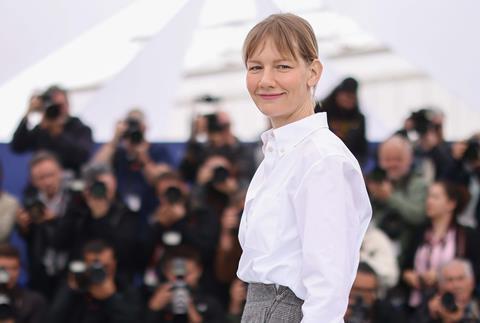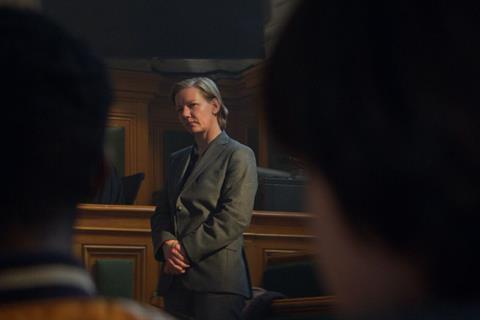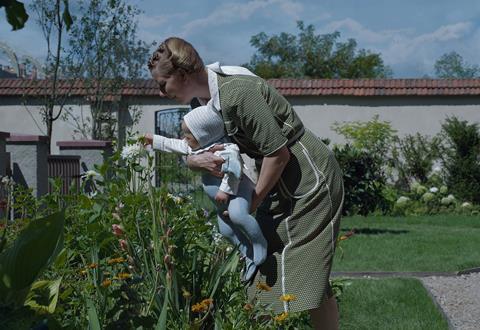Sandra Hüller is generating awards buzz for two powerful performances this year: in Anatomy Of A Fall and The Zone Of Interest. Screen talks to the German actress about the work that could propel her —if she wishes — into a Hollywood career.

With not one but two films getting serious awards traction in the US, it is not unreasonable to wonder whether Sandra Hüller has ambitions to work in Hollywood. The East German-born actress, however, laughs it off.
“I never know why that question is so interesting!” she says. “So far, things have come my way and I’ve been lucky. Of course, there are directors I’d like to work with, but I never say who because if I miss someone out I feel bad. But it would certainly be difficult with a family base in Germany to work in the US. Really, I have no idea what’s going to come. Nothing happened after Toni Erdmann [the 2016 comedy that made her name] and the same could happen again.”
The two films in question — Justine Triet’s Anatomy Of A Fall and Jonathan Glazer’s The Zone Of Interest — won the top two awards at Cannes Film Festival in May, and showcase Hüller’s ability to play two starkly different characters. Sandra, in the former, is a sophisticated novelist whose refusal to bow to gender conventions lands her in court when her husband dies suddenly. In the latter she plays Hedwig, the matronly wife of SS officer Rudolph Höss, commandant of the Auschwitz extermination camp.
Released by Neon in North America and jointly by Picturehouse Entertainment and Lionsgate in the UK, Anatomy Of A Fall sees Hüller back working with Triet after the 2019 comedy drama Sibyl. “Working with Justine feels so simple,” says Hüller. “Technically she collects a lot of material — that’s what I am familiar with coming from theatre, to sometimes go down the wrong path and change directions. Maybe the instinct to collect lots of material is a female thing — Ursula K Le Guin’s carrier-bag theory of human evolution — but I’ve seen men do it too. Anatomy seemed like a constant rehearsal that was recorded on camera. It was a constant exploration of the material and the themes.”
Triet did not reveal to the cast whether Sandra is truly guilty or innocent of killing husband Samuel (Samuel Theis), something that Hüller says did not affect how she approached playing the character. “The film is not really about whether she did it or not,” says Hüller. “It’s about trying to find your own truth; and if you [want] freedom, do you automatically take that away from someone else? And about the judgment of a woman who dares to take what she needs and wants.”
Hüller speaks French and English in the film, but no German. “It was just the right amount of challenge to make it enjoyable,” she says. “It took a lot of preparation with my French teacher, and that meant I got closer to the script, which I don’t usually do because I don’t usually read the script that often. So that was very interesting. I hope I can learn other languages for future work because I love the process of finding out how these things work. It’s like solving a riddle.”
Bulletproof script

If the film’s pivotal scene — one in which Sandra and Samuel’s discussion about childcare turns into a visceral fight about their relationship and the concessions they have or have not made to accommodate each other — comes across as so authentic, it is down, says Hüller modestly, to the screenplay by Triet and real-life partner Arthur Harari. “There were about 60 drafts of that scene, so it was bulletproof,” she says. “Nothing was improvised. I don’t like to invent words. The writers put so much thought into the script and then an actor comes and says, ‘La la la’ — that makes no sense to me.
“We only rehearsed on set and let the camera roll all the time, because sometimes you get better stuff when you don’t think about it too much,” she continues. “There were two cameras and it took two days to shoot. Each time it was shot in one [continuous] take, so it felt familiar to theatre.”
Hüller was born in the East German town of Suhl in 1978. She began her career in the theatre, then spent six years at Theatre Basel after graduating from Berlin’s Ernst Busch Academy of Dramatic Arts, and is now a member of theatre company Schauspielhaus Bochum. She was named best actress at the 2006 Berlinale for Hans-Christian Schmid’s drama Requiem, but it was her turn in Maren Ade’s Cannes premiere Toni Erdmann that sealed her reputation as one of Germany’s strongest and most fearless performers.
Her theatre training brought mixed blessings when it came to shifting to the big screen. “Discipline was the first thing I learned in theatre,” she says. “Then stage technique — to be focused for a long time. What theatre didn’t teach me was to just be there for a little bit and then go away. I have difficulty with filming little snippets. It’s probably not the smartest thing to say, but I don’t know how to do that. Theatre also taught me how to use the body, that acting is not just about the face — it’s connected to the entire system.”
Heavy responsibility

That ability to use the body is brought to light in A24’s The Zone Of Interest, as Hüller’s Hedwig bustles inelegantly around the house and garden in frumpy frocks, sensible shoes and pin-curled hair. “Working with the body was my only chance [to get into that character],” says Hüller, “because there wasn’t much soul there. I refused to give her anything from me. The heaviness she has, the weight of the guilt on her shoulders she won’t ever admit, her lack of sophistication, the fact she never stops — because, as Jonathan Glazer said, in order to think about the things you do, you have to stop, and if she sat still the demons would come — all those give her a sort of armour.”
Hüller has two projects in the pipeline. Already shot is Natja Brunckhorst’s Two To One (Zwei Zu Eins), about three people who bring back into circulation 3,000 tonnes of East German bank notes, buried underground after reunification in 1990. Next year she films Markus Schleinzer’s 17th-century-set drama Rose, inspired by documented accounts of women disguised as men in European history.
These stories easily snagged Hüller’s interest, but she admits she initially bristled at the thought of starring in The Zone Of Interest, given its subject matter. “The production decisions [persuaded me],” she says. “They built a replica house next to the real Höss house, recreated from pictures and interviews.
“The crew was in the basement or outside and the cameras hidden around the house,” she continues. “It was clear it would not be a common — I can’t even say it — Nazi drama, with the exploitation of the uniforms, the glamour that people sometimes take advantage of. Jonathan had the same doubts about representation, that made me trust him and the team.
“The script didn’t try to tell a dramatic story. There was kind of a revenge in that, because they didn’t deserve a good story, so the duller the story, the better it was, and the more you realised what was really going on.”

























No comments yet